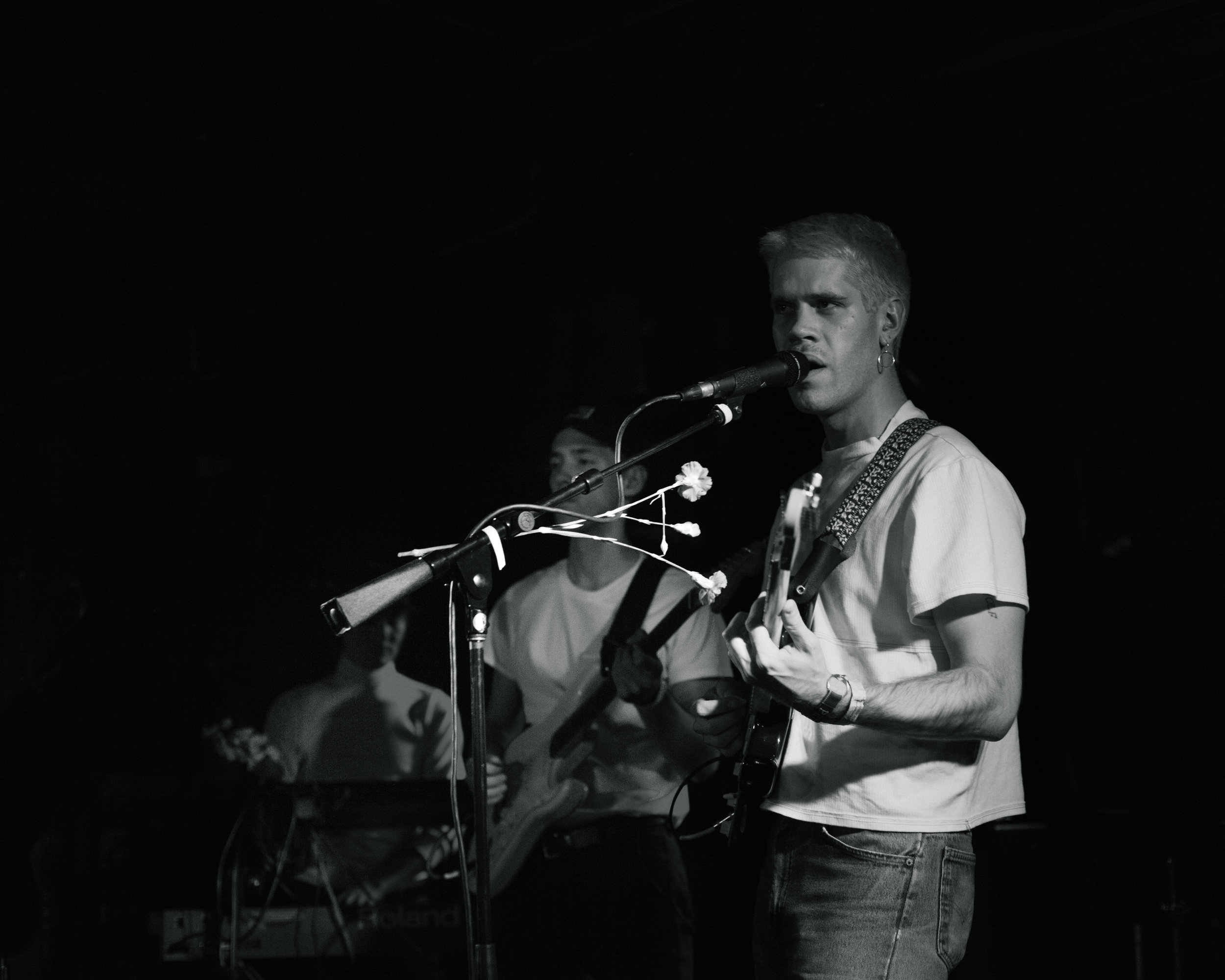Is it strange seeing people sing and dance along to you singing about escapist things like your “loner hour”?
No, I really love that. I kind of planned on the juxtaposition of that more melancholic content adjacent to upbeat dance-ish songs. I feel like I don’t have that much control about what I’m drawn to write about lyrically, but I do feel like I can kind of choose what way to present that, and I just wanted to, especially with Pool, put some sort of thing out that people could definitely dance to and have a positive time during the live show, or, you know, even listening to it on the speakers and headphones. So it’s cool, it’s exciting. I feel like for a while the live show wasn’t like that, and it kind of demanded this other sort of attention from the audience to get on this weirder, maybe not depressing, but kind of angsty emotional level. We played a lot over the past five years and it takes a little time for the older fans to adjust to the new tempo and overall vibe of how the band sounds now, and it’s really exciting to see people kind of catching on and realizing it’s cool to dance and it’s encouraged, and slowly seeing the new direction catch on with the audiences. It’s really exciting.
Is it for that reason you usually avoid putting past material in the setlist, save for “Headsgiving” and maybe one or two more from Slow Dance in the Cosmos? Is it a conscious decision to move on, or do you just want to preserve the experience of the new material more in its entirety?
Yeah, I guess it’s a little bit of both. I think naturally I’m most excited about the most recent music that I’ve made, so it seems natural to me to kind of play most of that stuff. For a while there was a little more half-and-half - newer stuff and older stuff - and it felt like it kinda worked. There’s a way to kind of work the setlist to where we would start off with the newer kind of subtler arrangements and kind of ramp up to the older kind of like distorted rock songs. We’ve just been kind of learning the new tracks from Pool and that’s what were focusing on now, it’s what the press is focusing on now, so it feels good to play that stuff. And I like to throw in some older songs for, I guess myself and for the audience too, like stuff from Slow Dance. We actually learned "Daddies" and this is like the first tour that we’ve ever played that song live, and that’s an even older song, so it’s kind of fun to be able to pluck songs from different chapters from Porches, but I like playing the new stuff a lot.
I’ve seen a couple of your shows this cycle and “Shape” seems to be the only track off of Pool that you don’t play. Is there a reason for that? Personally, it’s one of my favorites.
Yeah, it’s one of my favorites too, we just haven’t gotten around to arranging it. It’s kind of like a trickier one to pull off live ‘cause it is so sparse and relies so much on production in the studio, but yeah, that will happen eventually. I really do like that song a lot and I think it would be cool to play it live.
I read the Pool track “Glow” was an evolution of a demo from years ago, and on Slow Dance in the Cosmos you had a track called “After Glow.” What’s the connection there? Is the latter a sort of sequel?
No, they were actually written pretty far apart. Most of the stuff on Pool, like “Glow” and “Mood,” I wrote those all around the same time, which was a while ago. Maybe like two years or something, which is kind of crazy to think about. But yeah, I was conscious of calling it “After Glow,” and they’re not really related, but I think you could kind of make them related if you wanted to think about it that way. I like the idea of some sort of weird continuity or reoccurring theme between albums or within albums, so there’s that.
I noticed you haven’t been playing encores. Is that a regular thing?
I’ve always had a really hard time with the concept of encores and the fact that as a band you might come to expect it. You even write, like you decide what songs you’re gonna play for an encore, if there is one, and it just seems like a sort of goofy showy thing; leaving the stage and waiting for the audience to call for you to come back. So last tour in the Spring I always felt like so awkward after and never wanted to do it. So it’s not like we we’re not doing encores, but I’ve just been saying “This is where we would end the set and I hope that you guys want to hear the rest of the set, but if it’s cool with you we’ll just play like three more songs - it would be great to just stay up here and finish out the set.” That’s kind of been the best situation for us so far, to just stay up there and play a 15, 16-song set and eliminate that weird encore thing. It seems like a joke.
Do you think the encore will become obsolete then and start to go away?
I don’t know. It doesn’t seem like it. It just seems like textbook now. I imagine in the past it used to be you wouldn’t expect that, and if it did happen it would be a really special thing, and you would come back out. I just don’t like how calculated it’s become, and it seems kind of flashy to expect it. I mean, I’m down if people do it, that’s all cool, but it always made me feel a little strange. So I’m glad that we figured out a way to kind of ask if they mind if we play a few more songs. I did do one last night, for some reason they will usually put on a song right after the last song to signify that the set is in fact over, but there was no song, and people were really yelling for an encore. So I did go back out and play a solo song which was fun and that felt better ‘cause I hadn’t planned on it and I had kind of told everyone that this was the set. But they really did insist, so that felt right.
How has it been touring without Greta for the first time this record?
Probably what anyone would imagine; it’s difficult to be away from her for long periods of time. She’s been touring this year with her new album, and luckily we have the same booking agent and most off the tours have overlapped for the most part, so where it could really get tricky and we could be away for four months at a time, it’s been like, I don’t know, two-ish at the most. So yeah, it’s hard, but it’s good that she’s doing the same thing and we both understand how it works. It’s kind of difficult to communicate and I guess it makes it a little bit easier to not take it personally if it’s hard to get on the phone or something. At the same time I think it’s been nice ‘cause towards the end when we were playing in each other’s bands it just got so hectic. We’d practice together with those bands each week and then we’d tour together and live together and that was a lot. It was fun, but I think it’s also nice to be able to both feel like we’re out there doing our own thing and looking after ourselves, and learning how to look after yourself is an important part of being in a relationship too. So it’s not perfect, but it’s got its perks and it’s got its downsides.






















